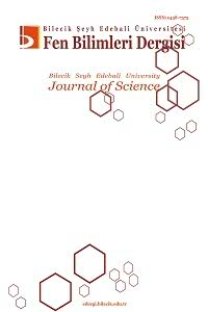1-Naftalen-2-il-etanon-o-propil-oksimin Kuantum Kimyasal Çalışmaları
Bu çalışmada, biyolojik aktif özellik gösterebilen 1-naftalen-2-il-etanon-O-propil-oksim (NEOPO) molekülünün kuantum kimyasal özellikleri, yapısal, spektroskopik, elektronik ve moleküler yerleştirme olarak sunulmuştur. Tüm kuantum kimyasal çalışmalar B3LYP / 6-311 ++ G (d, p) yöntem ve temel seti ile yoğunluk fonksiyonel teorisi (DFT) ile gerçekleştirilmiştir. Spektroskopik özellikleri, atom yükleri, HOMO-LUMO moleküler orbitalleri, kimyasal reaktivite ve moleküler elektrostatik potansiyeli (MEP) teorik olarak araştırılmıştır. Spektroskopik özellikler deneysel olarak desteklenmiştir. Ayrıca, moleküler yerleştirme çalışmaları için Autodock / Vina programı kullanılmış ve bağlanma serbest enerjileri DNA-molekül ve protein-molekül etkileşimleri için sırasıyla -27.20 ve -34.73 kJ / mol olarak hesaplanmıştır.
Quantum Chemical Studies of 1-Naphthalen-2-yl-ethanone-o-propyl-oxime
In this work, quantum chemical properties of 1-naphthalen-2-yl-ethanone-O-propyl-oxime (NEOPO) molecule which may be biologically active have been presented as a structural, spectroscopic, electronic and molecular docking. All quantum chemical studies were performed by density functional theory (DFT) with the B3LYP / 6-311++G(d,p) method and basis set. The spectroscopic properties, atomic charges, HOMO-LUMO molecular orbitals, chemical reactivity and molecular electrostatic potential (MEP) were investigated as theoretically. The spectroscopic properties have been supported as experimentally. In addition, the Autodock/Vina program was used for molecular docking studies and the binding free energies were calculated as -27.20 and -34.73 kJ/mol for DNA-molecule and protein-molecule interactions, respectively.
___
- [1] Zhu, X.F. Shi, D.Q. (2009) Chin. J. Chem. 27, 565.
- [2] Abele, E. Lukevics, E. (2000) Org. Prep. Proc. Int. 32, 237.
- [3] Mobio, I.G. Soldatankov, A.T. Fedorov, V.O. (1989) Khim. Farm. Zh. 23 ,421.
- [4] Krishnakumar, V. Prabavathi, N. Muthunatesan. S. (2008) Spectrochim. Acta A:Mol. Biomol. Spectr. 69, 528.
- [5] Govindarajan, M. Karabacak. M. (2013) Spectrochim. Acta A: Mol. Biomol.Spectr. 101, 314.
- [6] Akman, F. Durak, R. Kacal, M.R. Bezgin. F. (2016) X-Ray Spectr. 45, 103.
- [7] Li, C. Zhang, H. Cui, Y. Zhang, S. Zhao, Z. Choi, M.C.K. Chan, A.S.C. (2003) Synthetic Communication 33, 543.
- [8] Frisch, M. J. et al. (2010) Gaussian 09, Revision C.01, Gaussian, Inc., Wallingford CT.
- [9] Becke, A.D. (1993) J Chem. Phys. 98, 5648.
- [10] Foresman, J.B. Frisch, E. (1993) Exploring Chemistry with Electronic Structure Methods, Gaussian Inc., Pittsburgh, PA, USA.
- [11] Sundaraganesan, N. Ilakiamani, S. Saleem, H. Wojciechowski, P.M. Michalska, D. (2005) Spectrochim. Acta. A 61, 2995.
- [12] Jesus, A.J.L. Rosado, M.T.S. Reva, I. Fausto, R. Eusebio, M.E. Redinha, J.S. (2006) J. Phys. Chem. A 110, 4169.
- [13] Trott, O. Olson, A.J. (2010) J. Comput. Chem. 31, 455.
- [14] Kaya, Y. Yilmaz, V.T. Arslan, T. Buyukgungor, O. (2012) J. Mol. Struc. 1024, 65.
- [15] Colthup, N.B. Daly, L.H. Wiberley, S.E. (1964) Introduction to Infrared and Raman Spectroscopy, Academic Press Inc., London.
- [16] Kaya, Y. Yilmaz, V.T. (2014) Structural Chem. 25, 231.
- [17] Parr, R.G. Yang, W. (1989) Density Functional Theory of Atoms and Molecules. New York:Oxford University Press.
- [18] Bopp, F. Meixner, J. Kestin, J. (1967) Thermodynamics and StatisticalMechanics, fifth ed. Academic Press Inc. (London) Ltd., New York.
- Yayın Aralığı: Yılda 2 Sayı
- Başlangıç: 2014
- Yayıncı: BİLECİK ŞEYH EDEBALİ ÜNİVERSİTESİ
Sayıdaki Diğer Makaleler
Dönen Makinelerde Eksenel Kaçıklık ve Dengesizliğin Titreşim Analizi
1-Naftalen-2-il-etanon-o-propil-oksimin Kuantum Kimyasal Çalışmaları
Düz Disklerdeki Bilardo Akışlarının Topolojik Geçişliliği
İsmail SAĞLAM, Ahmet Refah Torun
Artırımlı Sosyal Öğrenme Tabanlı Diferansiyel Gelişim Algoritması
Kuantum Tam Diferansiyel ve Uygulaması
İstilacı Ailanthus altissima (Mill.) Swingle (Simaroubaceae) Türünün Yaprak N ve P Rezorbsiyonu
Nohut (Cicer arietinum L.)’un Verim ve Kalitesine Ahır Gübre Dozlarının Etkisi
